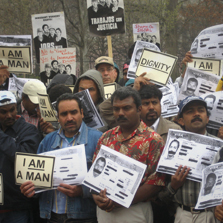Indian Guestworkers Ask Federal Court To Certify Largest Human Trafficking Civil Suit In U.S. History As Class Action
Workers Lured To U.S. After Hurricane Katrina And Subjected To Abusive Conditions Seek Class Certification
FOR IMMEDIATE RELEASE
CONTACT: (212) 549-2666; media@aclu.org
NEW ORLEANS – Lawyers for Indian guestworkers who are suing Signal International, LLC along with its co-conspirators and other entities for human trafficking and racketeering, filed for class certification today to include hundreds of additional Indian guestworkers in the lawsuit. If class status is granted, the lawsuit could be the largest human trafficking case in U.S. history.
The Southern Poverty Law Center (SPLC), American Civil Liberties Union (ACLU), Asian American Legal Defense and Education Fund (AALDEF), Louisiana Justice Institute (LJI) and the law firm Dewey & LeBoeuf LLP filed the original proposed class action lawsuit on behalf of the seven individuals, who seek to represent a class of approximately 500 former guestworkers lured to work in the U.S. after Hurricane Katrina and subjected to racial and national origin discrimination, forced labor and other abuse by Signal and its agents and co-Defendants, including labor recruiters Sachin Dewan and Michael Pol and immigration attorney Malvern Burnett. Today's filing urges the court to certify the class.
Signal, a marine and fabrication company with shipyards in Mississippi, Texas and Alabama, is a subcontractor for several major multi-national companies. After Hurricane Katrina scattered its workforce, Signal retained its co-defendants who used the U.S. government's guestworker program to import employees to work as welders and pipefitters. Between 2004 and 2006, hundreds of Indian men paid the defendants as much as $20,000 each for travel, visa, recruitment and other fees after they were told it would lead to good jobs and permanent U.S. residency for themselves and their families.
However, when the men arrived at Signal in late 2006 and early 2007, they discovered that they wouldn't receive the green cards as promised, but rather 10-month guestworker visas. Signal also forced them to pay $1,050 a month to live in overcrowded, unsanitary and racially segregated labor camps where as many as 24 men shared a trailer with only two toilets. When the guestworkers tried to find their own housing, Signal officials told them they would still have the rent deducted from their paychecks. Visitors were not allowed into the camps, which were enclosed by fences. Company employees who stood guard at the camps regularly searched the workers' belongings. Workers who complained about the conditions they faced were threatened with deportation.
Quotes can be attributed as follows:
Kurian David, a class representative in the lawsuit: "We hope the court will give us all a chance to make our voices heard and to right the wrongs that were done against us. Signal and the other defendants should be held accountable for what they did to so many Indian guestworkers who worked for them, so that others won't have to go through the same terrible things."
Murugan Kandhasamy, a class representative in the lawsuit: "I speak on behalf of hundreds of Indian guestworkers subjected to abuse by Signal and its co-conspirators. We came to America for good jobs and opportunity, which we were denied, and now we are asking for justice."
Daniel Werner, SPLC Deputy Legal Director: "This case illustrates in shocking detail the abuse occurring within the nation's guestworker program. These workers only wanted the American dream but instead were bound to an abusive employer and forced to endure horrific conditions."
Chandra Bhatnagar, ACLU Human Rights Program staff attorney: "These courageous men who have been victimized by systemic deficiencies in the U.S. guestworker program and subjected to trafficking and racketeering at the hands of the defendants are seeking to assert their fundamental human rights. We hope the court will certify the class and enable several hundred of their fellow Indian guestworkers to have their day in court."
Alan Howard of Dewey & LeBoeuf, which has been jointly litigating the case on a pro bono basis: "Class certification is warranted because that is precisely how Defendants treated Plaintiffs, as a class – albeit second-class – group of workers who could be exploited for higher profits."
Ivy Suriyopas, AALDEF staff attorney: "After being treated as disposable workers, these Indian guestworkers are entitled to seek justice for their wholesale mistreatment. They toiled under a climate of fear and coercion and deserve their day in court."
The guestworkers' attorneys filed the class action human trafficking and racketeering lawsuit in the U.S. District Court for the Eastern District of Louisiana in March 2008.
The class action complaint is available online at: www.splcenter.org/sites/default/files/downloads/case/Signal_Second_Amend... (PDF)
Today's filing is available at: www.aclu.org/human-rights-immigrants-rights/david-et-al-v-signal-interna...



